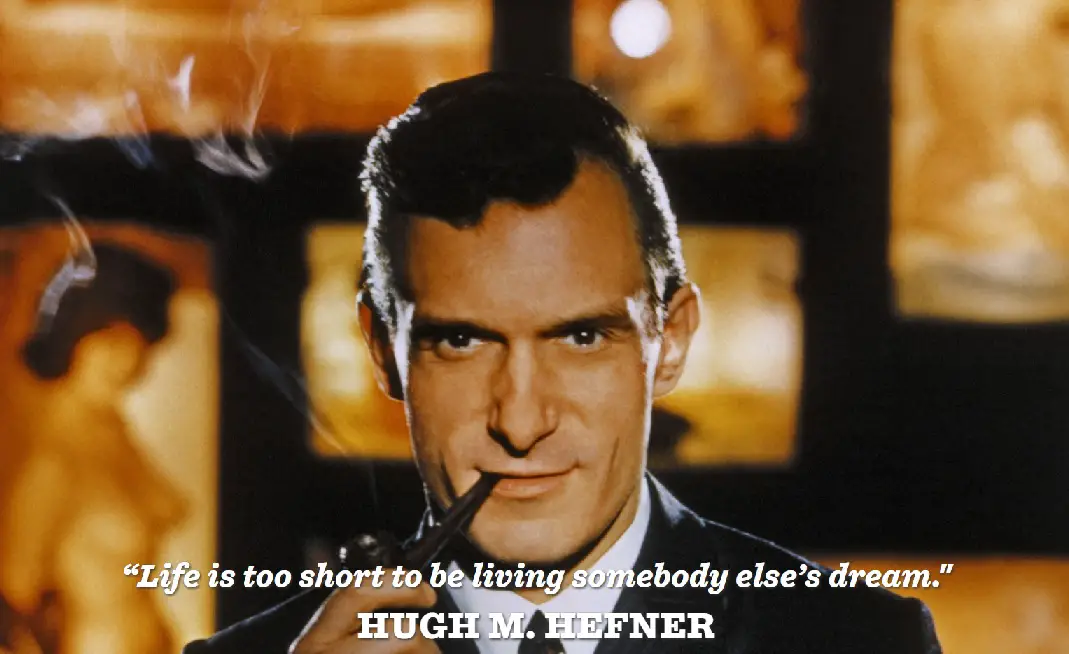A single static image of a young Hugh Hefner, confident in his prime, is all that graces the Playboy website this morning, “Life is too short to be living someone else’s dream” written along the bottom. Whether you loved him or loathed him, you cannot deny the influence his very personal brand has had upon the landscapes of media, culture, and social change. His death on Wednesday, September 27th, marks the passing of a man who, for better or for worse, truly changed the world.
Born in Chicago in 1926 to conservative parents, Hugh longed for a life different from his Protestant upbringing. He escaped into comics at a young age, drawing satirical accounts of his life which would later become the model for the Playboy magazine.
“I wrote short stories and lots of mysteries and horror stories and did comic books in grade school and high school. I actually started a comic-book autobiography in high school called ‘School Daze,’ about the adventures of my friends and myself. I then began adding clippings and photographs too. It eventually became like a scrapbook. I went directly out of high school into the Army; it was during World War II, and I continued that. The comic book was a way of creating your own world and being center stage. And only years later did I realize that when I started the magazine, and the way I used the magazine in my life, it had a direct parallel to what I did in high school. The comic book became the scrapbook that I have continued then throughout my life and now has over 2,000 volumes.” – From the 2009 LA Times Interview with Geoff Boucher
His career as a cartoonist floundered while working as a copywriter for Esquire  magazine in 1951 which led to the decision to leave the company to form his own magazine. The first edition of Playboy, debuted in 1953 featuring none other than Marilyn Monroe, began a firestorm of controversy about “decency” and contributed to the rise of both the religious right and the feminist movements. While the pages were filled mostly with scantily clad women in suggestive poses, the magazine also featured fiction, cartoons, and commentary from the brightest minds of our time. Authors like Margaret Atwood, Haruki Murakami, Roald Dahl, Jack Kerouac, and many others have contributed to the pages over the years giving credence to the often cliched line, “I only buy it for the articles.” Hefner stayed loyal to his early passion for comics by showcasing cartoons in every issue ever published, including many works by Jack Cole of Plastic Man fame and Shel Silverstein.
magazine in 1951 which led to the decision to leave the company to form his own magazine. The first edition of Playboy, debuted in 1953 featuring none other than Marilyn Monroe, began a firestorm of controversy about “decency” and contributed to the rise of both the religious right and the feminist movements. While the pages were filled mostly with scantily clad women in suggestive poses, the magazine also featured fiction, cartoons, and commentary from the brightest minds of our time. Authors like Margaret Atwood, Haruki Murakami, Roald Dahl, Jack Kerouac, and many others have contributed to the pages over the years giving credence to the often cliched line, “I only buy it for the articles.” Hefner stayed loyal to his early passion for comics by showcasing cartoons in every issue ever published, including many works by Jack Cole of Plastic Man fame and Shel Silverstein.

Check out those guns!
The depictions of women in the magazine and the fantasy lifestyle it portrayed have played a huge role in the direction of art in popular culture. Generations of young men were indoctrinated to see the objectification of women as sexy and desirable. Evidence of this is clear in the portrayal of women characters in comic and game form over the decades. Do we need to talk about female armor for exaggerated physical representations? You played Tomb Raider just for the killer weapons, right? In a historically male-dominated field, women in pop culture have had to fight the preconceived notions of intelligence vs. attractiveness to make their own creative mark in the genre. And it has not been an easy fight. In what has long been considered (by some) as a boys club, women are taking control, not away from but alongside, of the creative depictions of their sex. Women like Fiona Staples, G. Willow Wilson, and Kelly Sue DeConnick have created strong female leads across many universes that rival that of their male predecessors.
Despite many battles yet to conquer in the arena of equality in popular culture, homage must be paid to a man who broke the norms of his time. According to an interview on CNN, Hugh Hefner’s long-standing view that the only obscenities in the world are “Racism, war, bigotry but sex itself? No. What a sad and cold world this would be if we weren’t sexual beings. I mean that’s the heart of who we are.” He championed for race equality and LGBTQ rights long before it became mainstream to do so. He opened the door to question what we are told and to embrace what makes us uncomfortable. It is that endeavor that we should remember him by, not the girls, the parties, and the extravagant lifestyle. He made us face our sexuality and by doing so, brought empowerment to us all.
Join the AIPT Patreon
Want to take our relationship to the next level? Become a patron today to gain access to exclusive perks, such as:
- ❌ Remove all ads on the website
- 💬 Join our Discord community, where we chat about the latest news and releases from everything we cover on AIPT
- 📗 Access to our monthly book club
- 📦 Get a physical trade paperback shipped to you every month
- 💥 And more!












You must be logged in to post a comment.